
52+ Wedding Itinerary Templates – DOC, PDF, PSD
Weddings are a bonding between two families, but turning this event into the most memorable day for the bride and…
Nov 29, 2024
Crafting the ideal trip starts with a well-organized itinerary, and that’s where our expertly designed itinerary templates come in. Whether you’re gearing up for a weekend getaway, a family vacation, or a business trip, having a detailed trip itinerary ensures a stress-free and seamless travel experience. Our blog is your one-stop destination for versatile templates tailored to meet every traveler’s needs, offering clarity and convenience at your fingertips. Discover how easy it is to map out your journey with step-by-step guides and customizable formats that suit any destination or travel style. Let your adventures begin with the perfect itinerary!
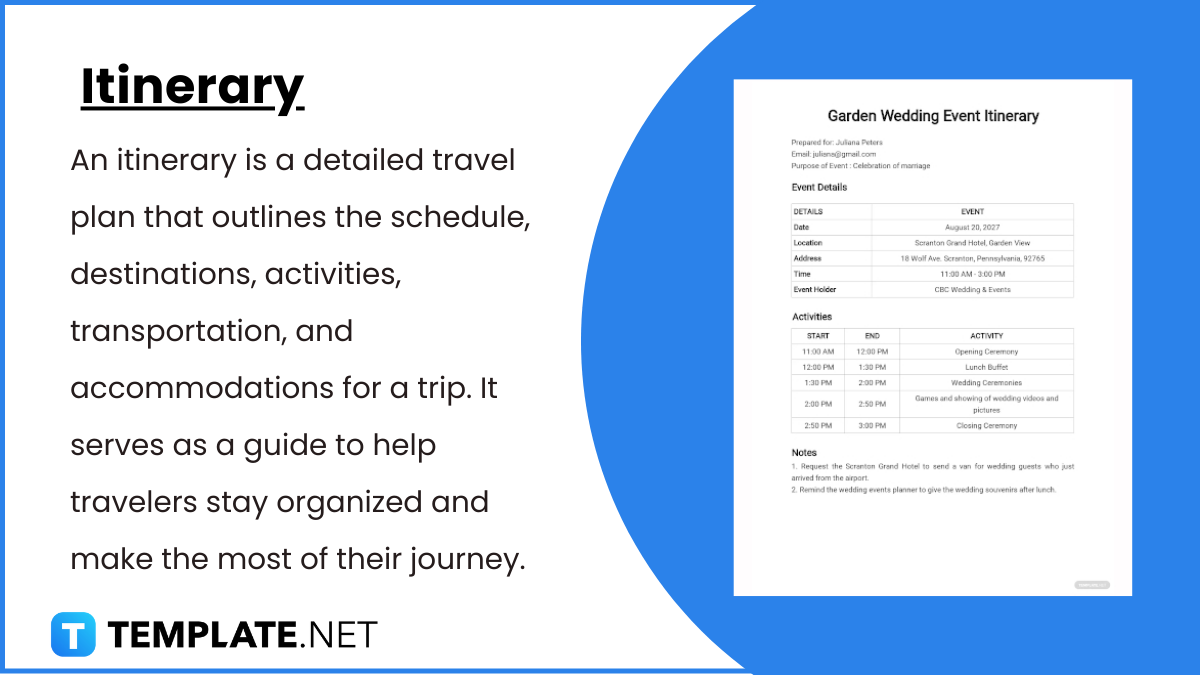
Start your itinerary with the trip name and duration to give an overview of the journey.
Organize your day-wise plans, including timings, activities, and locations, for a clear structure.
Provide essential information such as flight numbers, hotel addresses, and contact details to avoid confusion.
Include a section to track expenses, helping you stay within your planned budget.
Add additional details like emergency contacts, packing tips, or any other important reminders.
This is where a cute yet sample itinerary checklist template will definitely come in handy as it guarantees that everyone is at the right place at the right time. This article is going to teach you all that you need to know in order for you to be able to properly create one.
Are you planning a holiday for the family? If so, then feel free to check out this business itinerary to ensure all information relating to the trip is well-organized in a vacation planner. All you have to do is just fill in the necessary information and get it printed.
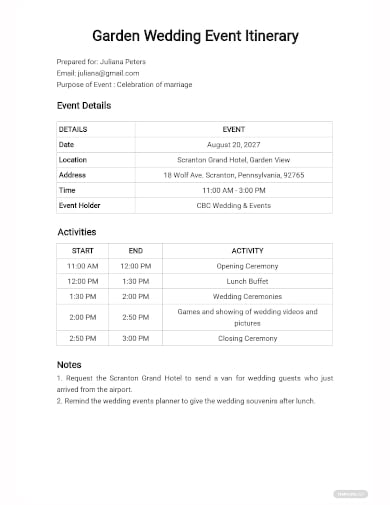
Here’s a ready-made templates for you to use for a wedding, party, and more. It consists of information related to departure, lodging, meeting time, locations, and so on. It can be easily customized and edited in all versions of MS Word Templates. Download it for free now.
Travelling can be fun and enjoyable if all things relating to the trip are properly organized and scheduled. To make sure things are in order, simply download and use these free Travel Agency to note down essential details of your trip such as your personal information, time of departure, lodging, etc.
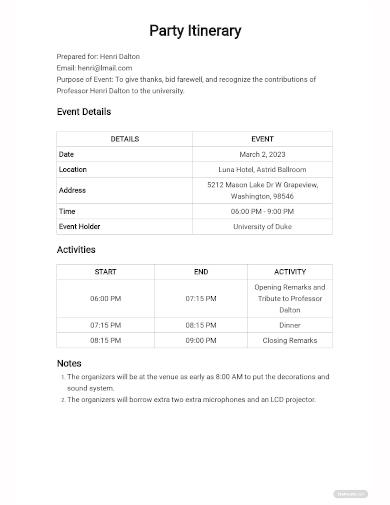
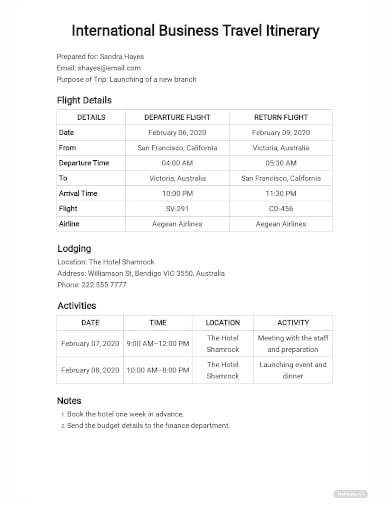
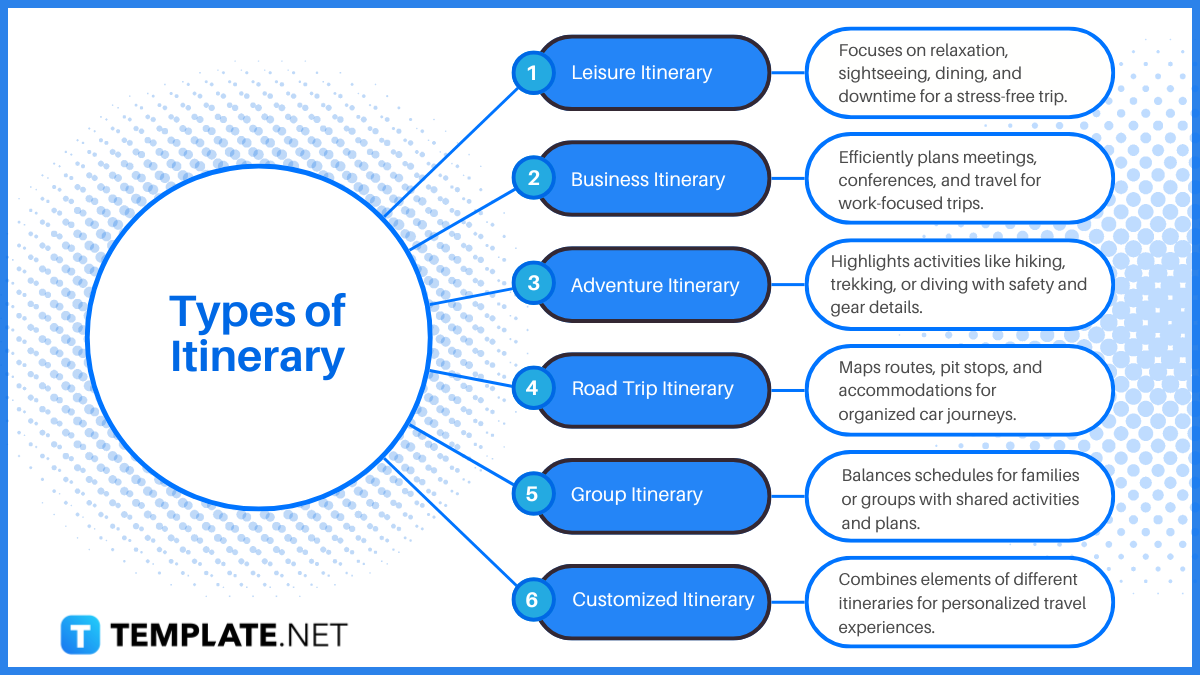
A leisure itinerary is created for vacationers looking to relax and explore new destinations at a comfortable pace. It typically includes details about tourist attractions, local sightseeing spots, dining options, and downtime for relaxation. This type of itinerary prioritizes enjoyment and ensures travelers make the most of their leisure time while avoiding over-scheduling.
A business itinerary is essential for work-related travel, focusing on efficiency and time management. It includes meeting schedules, conference locations, travel arrangements, and key contact details. Often, it incorporates tight timelines and allows flexibility to handle unexpected changes, making it an indispensable tool for professionals on the go.
Adventure itineraries are crafted for thrill-seekers who want to engage in activities like hiking, trekking, scuba diving, or safaris. They detail activity schedules, safety guidelines, necessary gear, and locations for adventurous excursions. These itineraries emphasize preparation and timing to ensure the activities are both enjoyable and safe.
Road trip itineraries are specifically tailored for journeys taken by car, outlining routes, pit stops, scenic viewpoints, and accommodation along the way. They often include information about fuel stations, estimated driving times, and alternative routes in case of detours. This type of itinerary ensures travelers can focus on the journey while staying organized.
Group itineraries are designed for families or groups traveling together, balancing the needs and preferences of multiple individuals. They include shared schedules for activities, accommodations that suit group sizes, and transportation plans. These itineraries also account for group dynamics and ensure everyone enjoys the trip collectively.
A customized itinerary combines elements from various types to suit individual preferences. Whether it’s a mix of leisure and adventure or a blend of business and relaxation, this itinerary is tailored to meet specific needs. It allows for flexibility and personalization, making it a favorite for travelers with unique travel goals.
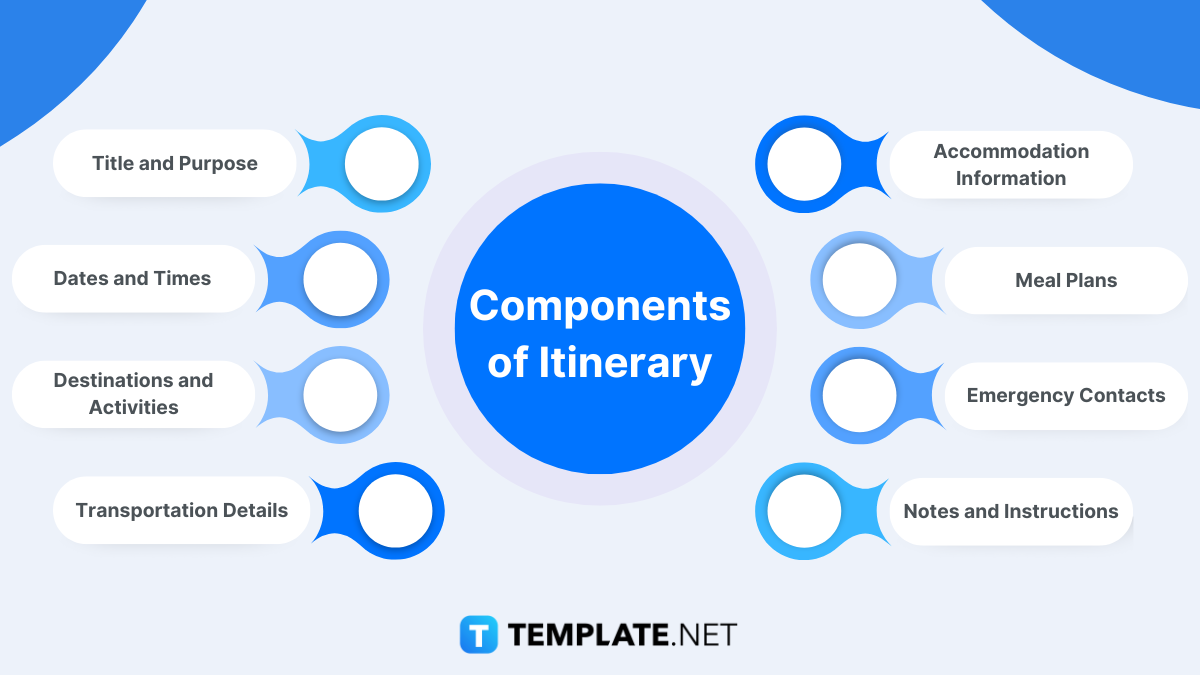
Defines the trip’s name and objective (e.g., leisure, business, or adventure).
Specifies start and end dates, along with a detailed activity schedule.
Lists planned destinations and activities for each location.
Includes flight, train, or car rental information with timings and contacts.
Details hotels, addresses, check-in/check-out timings, and contacts.
Outlines dining options or reservations for each day.
Provides crucial contact details for safety and assistance.
Covers packing tips, weather updates, and other important details.
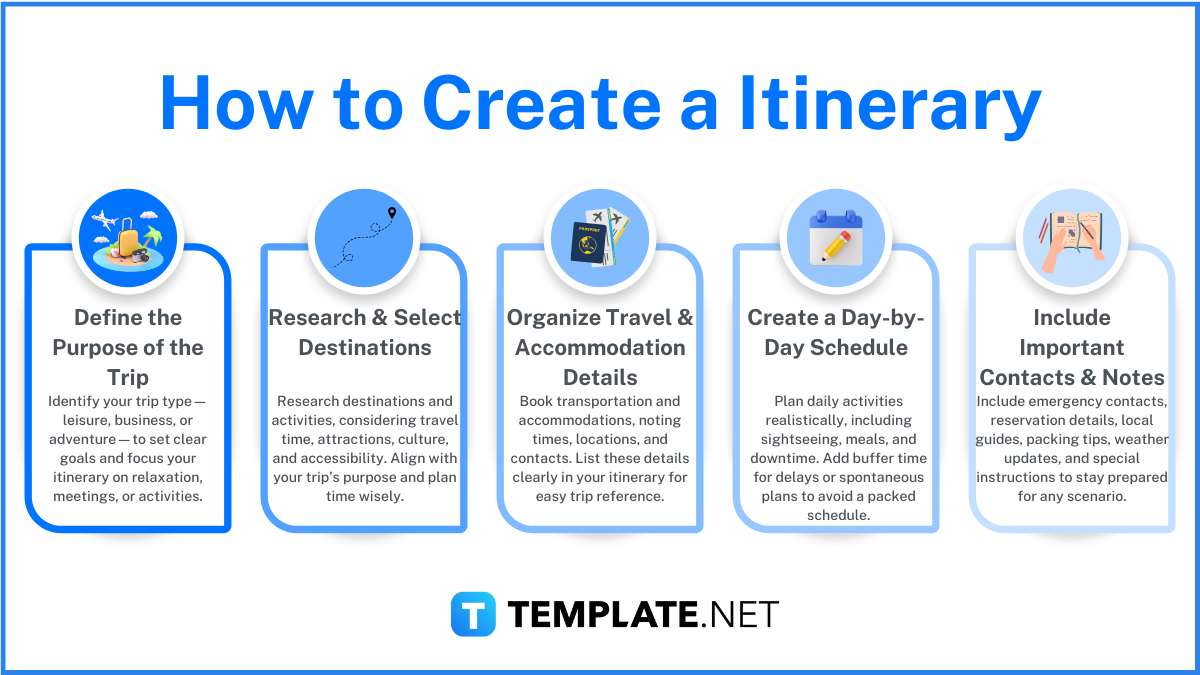
Start by identifying the type of trip you’re planning—leisure, business, adventure, or a combination. This helps outline the trip’s goals and determines the focus of the itinerary, whether it’s relaxation, meetings, or exploring activities.
Research the places you want to visit and activities you wish to include. Consider factors like travel time, attractions, local culture, and accessibility. Choose destinations that align with your trip’s purpose and allocate sufficient time for each location.
Book flights, trains, or other transportation and finalize accommodation options. Note down the exact times, locations, and contact details for each booking. Ensure these details are clearly listed in your itinerary for easy reference during the trip.
Plan daily activities, including sightseeing, meals, and downtime. Be realistic about the time required for each task to avoid overloading your schedule. Include buffer time to accommodate unexpected delays or spontaneous plans.
Add a section for emergency contacts, reservation numbers, and local guides or services. Include notes like packing tips, weather forecasts, and any special instructions relevant to the trip. This ensures you’re prepared for every scenario.
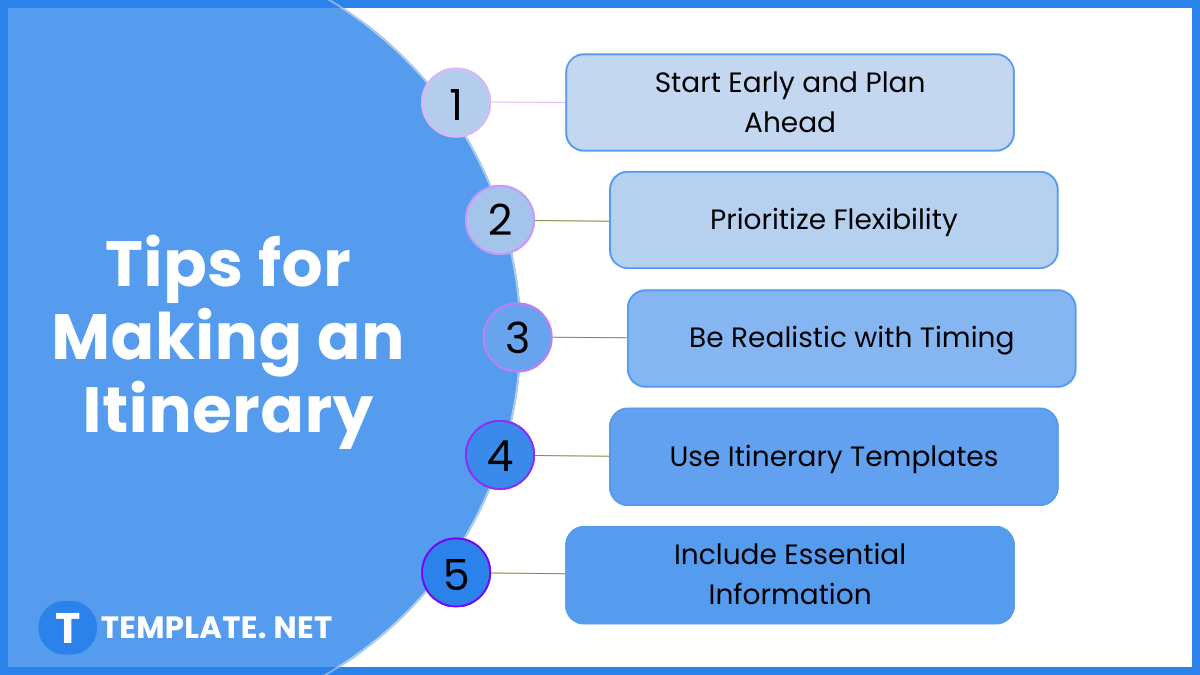
Begin your itinerary planning well in advance to secure the best deals on transportation and accommodations. Early planning also gives you ample time to research destinations and activities, ensuring you don’t miss out on must-see attractions.
While it’s essential to have a structured plan, leave room for spontaneity and unforeseen changes. Avoid overloading your schedule by including buffer time between activities to ensure a stress-free experience.
When scheduling activities, factor in travel time, rest periods, and unexpected delays. Overestimating how much you can do in a day can lead to exhaustion and missed opportunities.
Simplify the planning process by using pre-designed itinerary templates. These templates help you organize key details like dates, times, destinations, and activities in a clear and efficient format.
Ensure your itinerary includes contact numbers, addresses, reservation details, and emergency contacts. These details make your itinerary a reliable resource for navigating unexpected situations during your trip.
An itinerary is a detailed plan or schedule for a trip, outlining destinations, activities, transportation, and accommodations. It helps organize and manage travel efficiently.
A destination refers to the specific place or location you aim to visit during a trip, such as a city or tourist spot. An itinerary is the detailed plan or schedule that outlines the journey, including destinations, activities, transportation, and accommodations.
No, an itinerary alone is not enough to fly. You typically need a valid government-issued ID, a passport for international travel, and your flight ticket or boarding pass. The itinerary helps plan your trip but is not a substitute for the required travel documents.

Weddings are a bonding between two families, but turning this event into the most memorable day for the bride and…

An itinerary serves as a comprehensive travel plan that outlines key details like destinations, activities, and timings. Using an itinerary…

Church communal worships are generally held with a group of people, exclusively on Sundays and Saturdays for special occasions. The…

Time management is important in maintaining order in any form of system. Whether a large organization or a small house,…

Training programs that are held in the companies, educational institutions are dedicated programs that enlighten the members of the trainees…

How scary would it be if you would land up in a new country without a map, without any idea…

Your almost broken-down car or truck with the windows rolled down and the music turned up. That wild, unbridled laughter…

When the time comes that you have to go on a business trip, whether alone or in a group, you’ll…
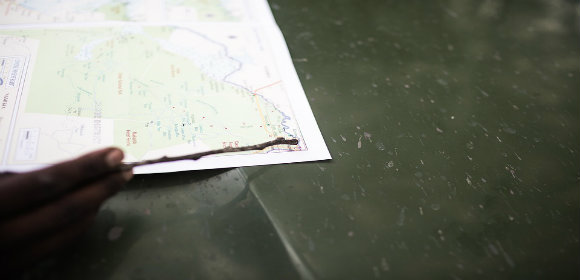
Should you decide to travel, especially if it’s for a business trip, it is very important that you are able…